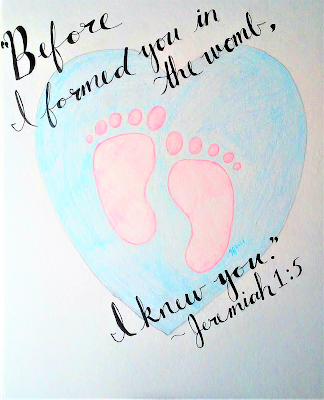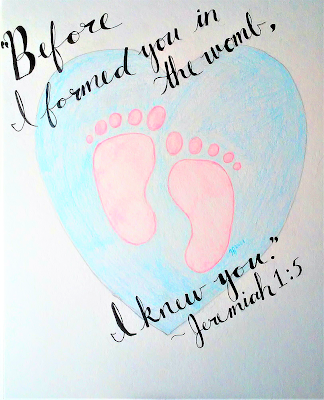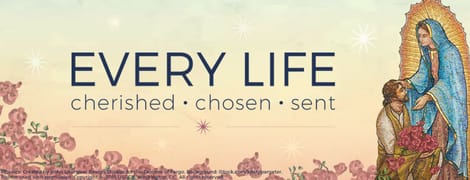JULY 2021 NEWSLETTER

- Featured Article
- Guest Article
- Prayers
- Pro-Life Quotes
- News
- Creative Corner
- Upcoming Events
- Submit Content
Featured Article:
Pro-Life Reflection - The Month of the Precious Blood: by Grace Chaffins
One of my favorite things about the Catholic Church is that each month offers us a new lens through which we can reflect upon the mysteries of our faith and apply those truths to the problems we face in our modern world. During this month of July, we turn our thoughts to the most precious Blood of Christ. This devotion has been observed by Christians since the very beginning of the Church and continues to be the center of our faith today. When we contemplate the precious Blood of Jesus, images of the passion and crucifixion are especially called to mind. During His passion and death, Jesus offered every drop of His Blood as a sacrifice to free humanity - tangible evidence of God’s love for us.
As Christians, we believe that we are made in the image and likeness of God Himself. What might this mean for us considering the sacredness and purity of the Blood of Christ? I believe that the answer can be found in the Bible itself. Within its very first pages, we can see the sanctity of human blood. After Cain kills his brother, Abel, God says to him, “What have you done? Your brother’s blood cries out to me from the ground!” (Genesis 4:10). These words imply an inherent preciousness of blood, and therefore of human life. If we truly believe that we are made in the image of God and that the blood of the innocent cries out to God for vengeance, we should stop and consider our situation today. In a world where the blood of millions of innocent children has been spilled, how much more must God direct the words He spoke to Cain to those of our generation?
However, these words should also give us hope. The sanctity of Christ’s blood and the worth of our own lives gives each one of us fundamental dignity and value as human beings. Although it may have initially seemed to the first followers of Christ that His death was meaningless and insignificant, we know the truth. Today, we must still hold onto this truth as we face the injustice of abortion. As with the death of Jesus, we must believe that no life lost, and no blood shed, is ever worthless. This month, let us keep this knowledge in our hearts as we seek to bring justice to the innocent blood which is crying out to God from the ground.
Guest Article:
Overlooked Discrimination (Protecting the Most Vulnerable)
In a world where equality and justice are of the utmost importance, there is a large group that is often overlooked by society: the unborn. Today’s civilization often places extreme emphasis on how unjust discrimination is evil, yet this world also allows one of the most discriminatory practices to be legal and even encouraged: abortions. Modern society tells the public that abortion should be legal, and in countries such as Canada and the United States, it is. Their reason is that abortion is ultimately the choice of the mother. Although it may seem like it, when one looks closer at the issue, it is not a choice the mother has the right to make. Abortion, which is mostly discrimination based on age, is unfair to a group of persons who are living human beings and are deserving of human rights (especially the right to life), regardless of development and circumstance.
In both the United States and Canada, abortion is an issue that many people face. The issue has become even more prominent in recent times, as we can see in the history of abortion in Canada. Before the R. v. Morgentaler case in 1988, abortion was illegal within Canada and performing abortion was a serious crime. In 1969, Prime Minister Pierre Trudeau allowed abortions due to health reasons, such as if the pregnancy threatened the mother’s life. Only the doctor and the patient could determine what the health reason was. For all other reasons, abortion was still illegal. However, Dr. Henry Morgentaler argued that abortions were a woman’s rights, and the abortion law was unconstitutional as it violated those rights. As of now, abortion is legal for all nine months of pregnancy—up to the moment of birth—for any reason. These abortions are funded by taxpayer’s dollars in every provincial healthcare system, even if the majority of Canadians do not support this. Abortion has become accepted in Canada.
The problem with legalizing abortions is that it only takes one person’s position into account: the mother’s. What about the person inside of her? Those who advocate for abortion will argue that the unborn is not a person. If the unborn is not a human person, it follows that the unborn does not have any human rights, including the right to life. But what if the unborn was a human person? For many years, humanity has struggled with the idea of a “human person.” Issues such as slavery, the Holocaust, women’s suffrage, and aboriginal concerns all began by denying a group of people the status of a “human person.” But what is a human person?
According to the United Nations, Human Rights—including the fundamental right to life—apply to all human beings. This means every member of the human family. So, to have human rights, one must simply of the species Homo sapiens. It sounds pretty straightforward. From a scientific lens, is not the unborn a human? If the DNA of the parents are human DNA, then the offspring must have human DNA as well. A dog, for example, cannot come from two human parents. Only a human can come from two human parents, nothing else. So, simply by having human DNA, the unborn are humans, and it follows that they should have human rights. The unborn are also living humans, as they meet the criteria for life. For example, the unborn grows, and the cells are reproducing (cell division). Is not pregnancy the growth of the unborn? Only living beings grow. According to scientists, life starts at fertilization for any organism that reproduces sexually. It is also worth mentioning that a zygote is a one-celled human organism, created when the sperm and egg meet. An organism, scientifically, is a name for a living human being. Thus, science tells us that the unborn is a living human.
Since the unborn are living human beings, abortion intentionally kills them. What does one call the end of a living human beings? It is death. If abortion willfully ends a pregnancy, by terminating the fetus or embryo, abortion violates the unborn’s right to life. If one looks closer at the issue, it becomes apparent that abortion is therefore murder—though many do not realize it because of the hidden nature of the embryo.
Advocates for legal abortion will argue that—even if the unborn has human rights—it is ultimately the woman’s body, and therefore abortion is the woman’s choice. Yet science tells us that the unborn is a separate being from the mother. The unborn has its own sets of DNAs, different from that of the mother. The unborn will grow to develop his or her own body parts, such as arms and legs. Mothers when they are pregnant do not claim that they have four arms, or two brains. Thus, the unborn is not a body part of the mother, such as one of her cells or organs. The unborn is a distinct, separate being.
So, the unborn is a human being, but is it a human person? People will say that yes, the unborn is human. But do they qualify for personhood? The social construct of personhood means the status of being a person. Under the law, persons have legal rights, protections, privileges, and responsibilities. How can society know that the fetus or embryo has the status of a person? Some will say that the unborn is small, therefore it cannot be a person. Yet why should size determine someone’s intrinsic dignity? Proposing that the unborn is not a person due to size is unjust. In the choice between life or death, size should not be a factor. People should not be treated unfairly based on their size.
Others will claim that the unborn is not a person as it cannot think or do the things that adults can do. It is true that the unborn is not capable of any adult-like rational ability, yet neither can newborn babies, and even some children and adults with disabilities. For the unborn, this is due to the stage of life he or she is in. As the fetus or embryo continues to grow, the baby will develop those skills. The term embryo and fetus are simply used to describe the stage of life a person is at, much like the terms teenager, child, and adult. Ability cannot determine one’s value as a person, and should not be a factor in human rights. Why should society unjustly discriminate based on age and ability?
Another argument for abortion is that the fetus or embryo is not a born human yet, and only those out of the womb should have human rights. Again, this is an example of an unfair discriminatory reason. Does the location of a human determine if the human is a person? What does the birth canal do that grants the born child human rights? After all, a newborn baby that has just been outside of the womb for one minute has hardly any difference from the unborn who has one minute until birth. The location of the human cannot determine the value of personhood.
What about dependency? There are those who will say that the unborn cannot survive without the mother, which is part of the “my body, my choice” argument. That is entirely correct, the unborn has a great dependency on the mother for survival. In fact, the unborn can only depend on his or her mother. There is a special place in the mother’s body made specifically for bringing a child into the world—the uterus. Its purpose is solely to keep the unborn baby alive. So only the mother can help the unborn survive. But why should this justify the killing of a human? It is morally wrong to abandon a newborn, and leave the baby alone for a week, without any assistance. Why? Because the baby will die. A baby outside of the womb, as well as toddlers and children, depends on another person for support. Society will agree that infanticide should be illegal, and it is. So why is it permissible to persecute the unborn? The fact that they rely more on someone else shows that grown adults have a greater responsibility towards them. Weaker and more vulnerable humans should be protected, not killed.
Nonetheless, most people who campaign for abortions say it should be legal for the hard cases, such as rape or the health of the mother. In Canada, less than one percent of abortions are for cases of rape and about three percent are so called abortions due to the health risks of the mother. These arguments, however, do not take away the dignity and right of the unborn. They do not take away the intrinsic evil in intentionally harming an innocent human being.
I agree that rape is terrible, and that it must be very difficult for the victim. It is a horrible evil, and it is unfortunate that rape is still present in the world today. However, rapists are not given the death penalty, nor are the victims. But the unborn conceived through rape is a victim of the crime as well. If the rapist cannot receive the death penalty, why is it given to one of the victims—the unborn? Rather, instead of persecuting victims of rape—both mother and child—they should be shown compassion and love. They should not be abandoned, and there are many pregnancy centers and organizations who specialize in caring for mothers with an unplanned pregnancy. They provide support and emotional healing for the mother, while helping her to care for herself and her child. Both sides of the abortion debate agree that abortion contributes to mental health problems in woman, so abortion in the case of rape would make it worse for the mother. Abortion does not have to be an option, and the dignity of every human person must be upheld.
In cases where the mother’s life is at risk, we must remember that abortion specifically targets the unborn and kills them. With that in mind, the medical treatments and procedures that are needed for the health of the mother are different. Multiple doctors and health care professionals claim that there is no illness or condition that requires direct abortion. Sometimes, the death of the child is a foreseen yet unintended side effect of the medical intervention. For example, in an ectopic pregnancy, the egg is growing in the fallopian tube instead of in the uterus. In that case, the tube will swell and rupture, possibly causing the death of the mother. The only cure that works is to remove the tube, and it saves the life of the mother, but sadly the baby will die. But that is not abortion. It is important to note that in this example, the death of the baby was not the goal of the medical treatment or procedure. An abortion, on the other hand, intentionally kills the fetus or embryo to end the pregnancy. That is the intended result. These cases must be distinguished. Abortion is never a solution.
Since abortion is the harming of an innocent human being who deserves human rights, especially the right to life, abortion should be illegal. The unborn are living humans and they are distinct persons. Society has the responsibility to protect them—the most vulnerable. It is agreed that intentionally killing another human being is a crime, and abortion cannot be an exception. For the United States and Canada to be countries where every human being is treated equally, abortion must be made illegal for the sake of those who are one of the most oppressed and silenced in this day and age.
Thank you to Rain for contributing this article!
Prayers:
Prayer to the Most Precious Blood of Jesus
O Most Precious Blood of Jesus, infinite price of the redemption of sinful humanity, solace and refreshment of our souls, you continuously foster our cause before the throne of Supreme Mercy. I profoundly adore you and want, as much as possible, to make reparation for the insults and disrespect you receive from human beings, especially from those who dare to blaspheme. Who will not bless this Blood of infinite value! Who would not be set aflame with love toward Jesus who shed this Blood? Who would I be if this Divine Blood had not redeemed me? Who removed it from the veins of my Lord to the last drop? Love did it! O immense love, which bestowed upon us this saving balm! O immeasurable balm which sprang from a spring of immense love, may all hearts and languages praise you, exult you and give you thanks now and forever. Amen.
Pro-Life Prayer to the Spirit of Truth
Holy Spirit, You are the promised Spirit of Truth, constantly revealing the splendor of truth to Your people, and leading us deeper into the Mysteries of our Faith.
Come to us today, and deepen in our minds and hearts the truth about life: its greatness, its dignity, its reflection of the eternal God. Make us appreciate ever more the truth that life is always a good, and that every life is of equal dignity, despite all the different characteristics people have, or the different circumstances under which they come to be.
Come, Spirit of Truth. Free all Your people from the falsehoods that lead to the evil of abortion. Free them from the false and harmful ideas which make a god out of their own choices, or which fail to recognize the right to life of children in the womb.
Come, O Holy Spirit, and as You immerse us in Your truth, so make us effective witnesses of that truth within our families, among our friends, and to all the world.
Amen.
Pro-Life Quotes:
“Before I formed you in the womb, I knew you; before you were born I sanctified you.” - St. Jeremiah 1:5 (Holy Bible)
"Being 'pro-life' means standing up for all life, valuing all life." - Abby Johnson
"Never tire of firmly speaking out in defense of life from its conception and do not be deterred from the commitment to defend the dignity of every human person with courageous determination. Christ is with you: be not afraid!" - St. John Paul II
News:
U.S. Catholic Bishops Vote to Take Action on Pro-Abortion Politicians
On June 18, 2021, the United States Conference of Catholic Bishops (USCCB) announced that by a margin of 168 to 55, U.S. bishops have voted to proceed with drafting a document that is expected to reiterate Catholic teaching that those who present themselves for Communion must submit to Catholic doctrine on abortion. This decision was made amidst recent political pressure with President Joe Biden professing devout Catholicism while using his political power to expand and fund abortion violence. In a statement reacting to the vote, Archbishop Cordileone of San Francisco said: “I’m grateful that the bishops of the United States placed their trust in the Holy Spirit to guide in our effort to promote and protect the sanctity of the Most Holy Eucharist...”
(summarized from Autumn Schimmer’s news update) For more information, read this blog post from SFLA: https://studentsforlifeaction.org/students-for-life-of-america-praises-u-s-bishops-vote-to-proceed-with-actions-to-address-pro-abortion-catholic-politicians/
Creative Corner:

We are looking for artistic content to fill our new Creative Corner! If you have something that you would like to contribute, please email us at hscstudentsforlife@gmail.com.
Upcoming Events:
Saturday, July 3rd at 2:00pm EST - Monthly Rosary Prayer Meeting
Saturday, July 10th at 6:30pm EST - Virtual Baby Shower. We will be gathering for a fun night of games and fellowship in order to donate materials through Amazon for a pregnancy resource center. These materials will be sent to pregnant women in order to support them during their pregnancy and encourage them to choose life.
Submit Content:
This newsletter relies heavily on the contributions of group members. There are a number of items we are looking for:
- Creative content: We have implemented a segment of the newsletter dedicated to the topically relevant artistic contributions of group members, regardless of medium. If you have anything to share, please send it in. We'll accept most mediums, including (pictures of) paintings, graphic design pieces, songs, videos, poems, etc.
- Articles: We are accepting topically relevant articles from group members. Please note, however, that the newsletter editors reserve the right to modify articles in order to make them suitable for publication. Such modifications may include grammatical corrections and removal of potentially offensive content.
- Quotes & Literary Passages: We are also looking for any topically relevant quotes or literary passages to fill a segment of the newsletter. Anything from a simple sentence spoken by a saint to a paragraph from a book can be accepted.
If you want to submit anything from the above categories, or you simply want to provide feedback or suggestions, please email us at hscstudentsforlife@gmail.com and we will get in touch with you shortly.




